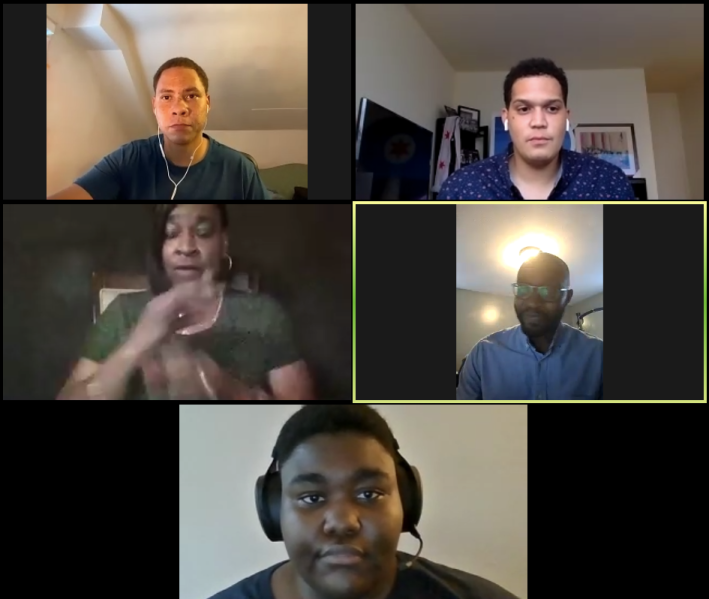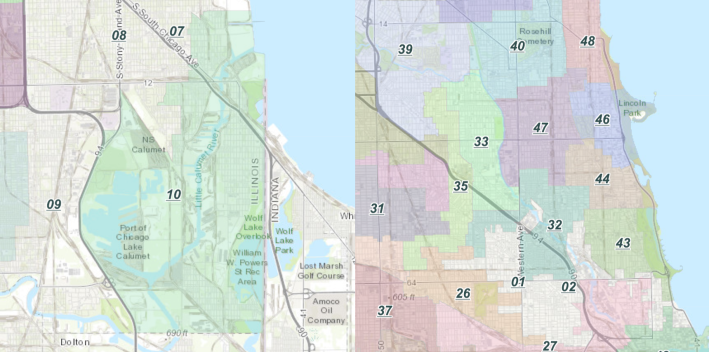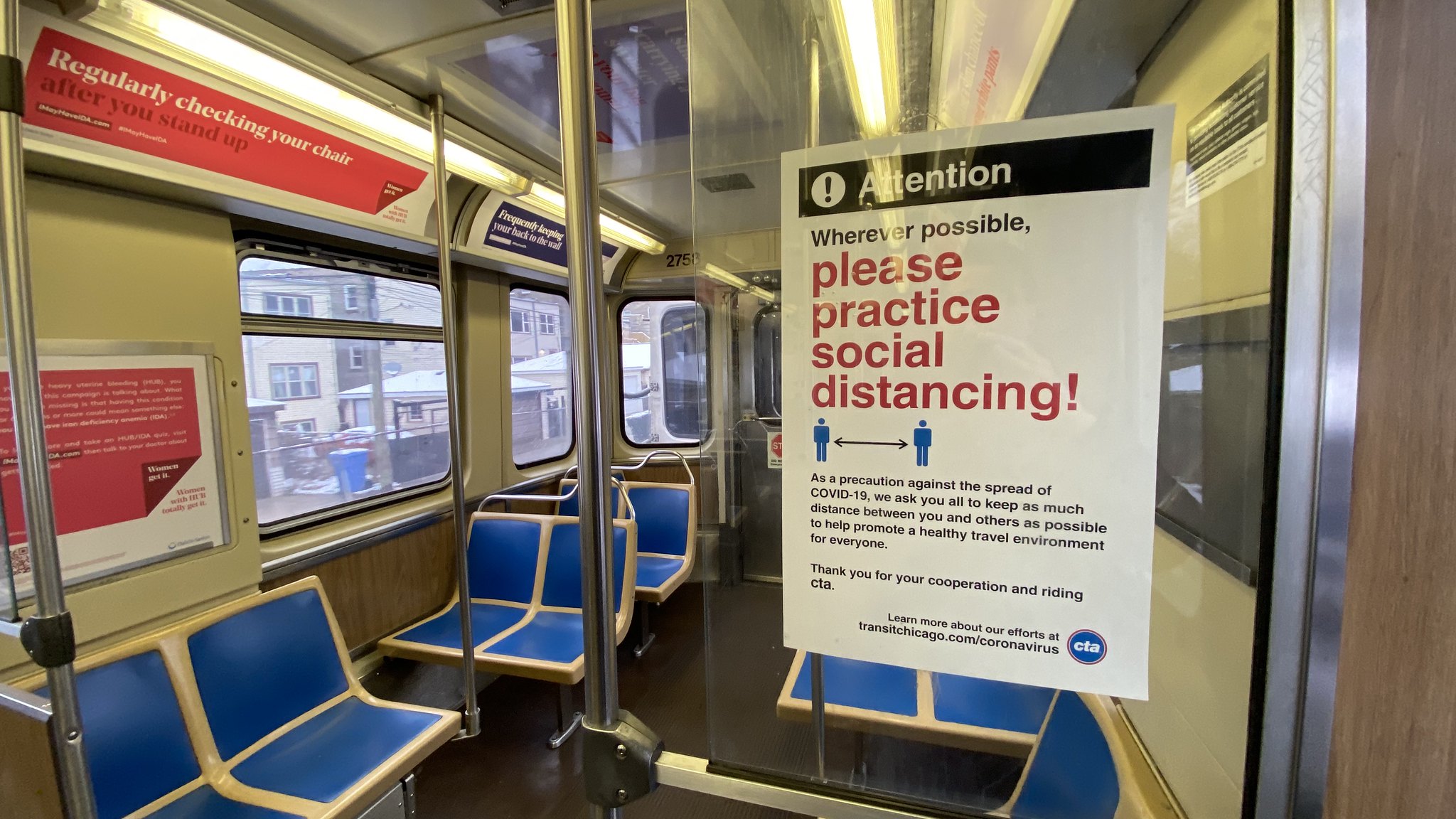On Monday evening the Active Transportation Alliance hosted a virtual town hall to discuss transportation equity with Illinois state senator Robert Peters of the 13th District, and 47th Ward alderman Matt Martin. The event coincided with ATA launching a petition demanding 30 miles of new bus lanes and masks for all CTA riders.
ATA campaign manager W. Robert Schultz, III kicked off the discussion by acknowledging the CTA bus-sized elephant in the room: The CARES act, which has provided crucial funding for transit during the pandemic, when ridership and revenue plummeted, is set to expire in mere days. However, federal funding was not the main topic of the forum, which instead focused on state and city-level action. But the dire need for financial support at the national level came up more than once in the 90-minute conversation.
The elected officials and two moderators, ATA bus organizing fellows Rylen Clark and Jamaine Alberto Gooding, made brief opening remarks, then posed a few broad questions about transportation justice. These subjects highlighted the different constituencies and issues in Peters' district, which includes the entire lakefront from Streeterville to the Indiana Border, and Martin's ward, which is mostly comprised of Lincoln Square on the North Side.
When asked how to improve transportation equity in Chicago, Peters discussed ideas to make it easier for South Siders to access other parts of the city by combining light and heavy rail with bikes and buses. He noted that the lack of free transfers between Metra and the CTA currently discourages people from using both systems for their commutes.
Martin discussed ATA's call for bus lanes to shorten trip times and reduce passengers' chances of viral exposure. He noted that the fact that his ward has better-than-average transit access has raised property values, property taxes, and rents, fueling housing displacement. He argued that that improving transit access citywide would reduce gentrification and displacement pressures in neighborhoods that are currently transit-friendly.
Martin said he envisioned a city-level transit plan with reporting requirements to ensure accountability. The alderman, who rolled out Chicago's first Slow Street on Leland Avenue, added that the Chicago Department of Transportation should build protected bike lanes in all neighborhoods to incentivize cycling citywide.

Next Gooding asked how both officials see transit as a vehicle for social and economic justice in their districts and the state. Peters talked about the inconvenience faced by his constituents who commute from the South Side to essential jobs on the North Side, who use an insufficient public transportation system plagued by unequal investment that can be seen in everything from the lack of bus lanes, to long waits for buses, to poorly cleaned and maintained stations.
“The thing about transportation is that the more accessible and easier it is, the better it is for the economy,” Peters said. “It almost is always the idea from every urban planner to talk about public transportation. The difference is who gets to have the public transportation and who doesn't, and I think economic justice is everybody has the right to [convenient] public transportation, not just the lucky few.”
Martin cited the need for more affordable housing in the transit-oriented developments in his ward and around the city. He noted that a just transit system offers independence and dignity to youth, the elderly, and people with disabilities. He also mentioned the environmental impacts of unsustainable transportation, which is now the top source of greenhouse gas emissions in the U.S. This spring, climate change-related severe storms and flooding disproportionately impacted low-income communities on the South Side.
Martin sits on City Council's Environmental Protection Committee and said one of his primary concerns is ways to reduce the impact of automobiles on the environment. He added that real change on this front will require cooperation between the city and the CTA. “The CTA is a sister agency, which means it's not something that city council has direct oversight over, and [the Council] certainly doesn't control their budget,” he said. “Which means when we have folks reaching out to us, when we have great conversations identifying shortcomings we would like CTA in part to take the lead in addressing, City Council isn't in a great position to help spearhead that.”
Martin also called overhauling the menu money system, which currently provides $1.3 million a year in discretionary funds for infrastructure in each of the 50 wards. While each ward has the same order of magnitude of residents, generally about 50,000, the alderman argued that the amount of money allocated should also reflect the geographic size and specific needs of wards.
“A ward like the 10th Ward,” Martin said, referring to the large, low-density district at the southeast corner of the city, “you can fit five North Side wards into it, including the 47th, but they get the same amount of money as we do…which means they are going to use a lot more money on [street] resurfacing because they have a lot more to cover. We need to make sure that one, the menu fund is going up and, two, it's getting split up in a better way that will free more offices to think innovatively on how they spend those menu funds.”

One of the most notable moments in the conversation was senator Peters’ impassioned reply to a question about the abrupt transit shutdown imposed during the George Floyd protests. “It was just another example of a longstanding history of dividing the city up and using a crisis to do so in the name of supposedly protecting people,” he said. “It turned downtown into a green zone similar to Baghdad that gated off an entire part of the city."
“I was absolutely disgusted and let people who needed to hear it hear it,” Peters added, noting that he was offended that the city of Chicago tweeted out an Uber promo code after shutting down transit. "It normalizes the ability for you to get around is by the third party tech company. It’s an example of American neoliberal tactics. We’ve used crises to disinvest in the public good.”
Near the end of the discussion, Clark asked Martin for his take on police accountability in light of the CTA’s $10 million contract with CPD, and the police shooting of an unarmed man who was stopped for crossing between Red Line cars, on the same day that Mayor Lightfoot announced an increase in transit policing. The alderman called for alternative interventions that don’t involve armed police, citing Eugene, Oregon’s CAHOOTS program, which partners social workers and police, as an example. “It not enough to look at it from accountability standpoint and say ‘Well, were those officers were investigated quickly for what appeared to be an incredibly unjustified shooting,' but [we need to consider], how can we take steps to prevent this from happening again?”
During the Q & A, an audience member asked the officials how concerned are they that people who would normally commute via transit will start to drive because they're afraid to use buses and trains, and what strategies could help prevent that mode shift. Peters responded that he expects the economic crisis will discourage car use and encourage transit ridership.
Martin noted that public transportation use would vary by community, but expressing concern that reduced ridership and revenue would lead to service cuts and/or fare hikes that would further depress ridership, creating a transit death spiral. “Some of the steepest decreases of CTA ridership have been along the Brown Line where there are higher concentrations of white-collar workers and folks working remotely,” he said. “Way too large a percentage of CTA and Metra's budget comes from fares. I’m concerned we’ll see draconian cuts to our system and folks will have less faith in the efficacy of our system.”





